Heart of Paralympic Gold: A leg lost in Charlotte paved a new dream to Paris
It’s the week of the Fourth of July, and Carson Clough is explaining a feeling he’s known forever.
It’s the feeling that comes when everything aligns: when the water off the coast of Virginia Beach breaks at the right time, when he paddles out at just the right speed, when he hops up on the surfboard with just the right amount of finesse and focus and fearlessness. He describes it as “incredible.” For someone who doesn’t dwell too much on anything, who prefers forging forward, Clough doesn’t mind talking about surfing — even if it represents all that’s changed in his life.
“Do you surf at all?” Clough asks me. It’s a Monday afternoon in Charlotte at The Giddy Goat Coffee Roasters, a coffee house that Clough, 30, helped open with a business partner in the summer of 2020. Clough is wearing a white soccer jersey with some chocolate stains on it and a hat that covers his flowing blond hair. We’re sitting at a shaded picnic table to talk about the trials and triumphs Clough has faced over the last five years. There’s a lot to draw from.
In the summer of 2019, Clough nearly lost both of his legs in a boating accident on Lake Norman. The left leg was saved; some of the right leg was not. His amputated right leg was then replaced by a prosthetic one — a blade of carbon fiber that suctions onto his right calf and then attaches to a long strip of metal and a springy foot — and now, long story incredibly short, Clough is preparing to represent Team USA in the 2024 Paralympic Games in Paris. The Games will take place Aug. 28 through Sept. 8 and bring together as many as 4,400 athletes from around the world.
The Charlotte native and resident is a triathlete, meaning he competes in the event that combines running and swimming and cycling. He’s ranked No. 2 in the World Triathlon Qualification Ranking and third in the Para Triathlon Ranking with four wins, nine podiums and 19 starts in his career.
He somehow turned a life-threatening moment into a one-in-a-million opportunity. A new leg into a new dream. He loved his “two-legged life,” he said, and he loves his “one-legged life,” too.
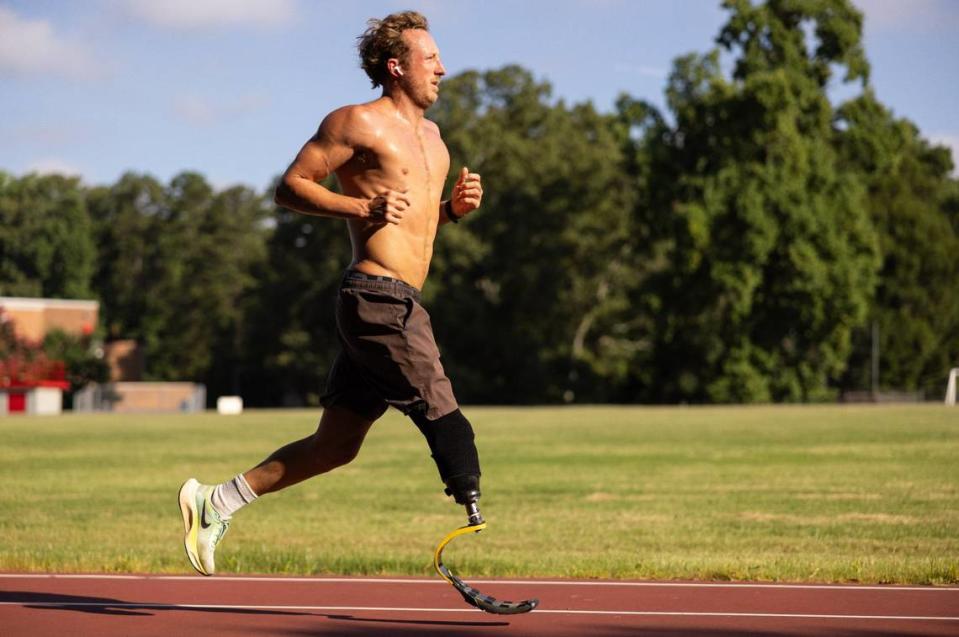
But if there’s one thing he could change, it would be his current status with surfing, what it feels like to be out on the water — the place where he learned to match life’s up and downs, where his grandpa Bop tossed him into the water with a lifejacket when he was 2 feet tall, where the endlessly energetic big brother could temporarily stop competing with his his sister, Cannon, and younger brother, Cole, and just live.
Surfing was about as meditative an activity as Clough’s done. The water was a place where he had no problems.
“That was it for me in my two-legged life,” Clough explains. “One-legged life, not so much right now. Because of my leg. A surfing leg has a pin that locks in. Right now I only have suction, and so every time I surf, I risk my leg falling off. This leg is like 10,000 to 25,000 bucks. I’m not losing that in the ocean.”
He laughs: “It’s the No. 1 thing that frustrates me that has changed.”
Him losing a step as a surfer — as in: he’s still a good surfer but not as good as he once was yet — is a reflection of how much he loves catching waves, sure. But it’s also a reflection of the unrelentingly positive guy Clough is, of the inspiration that Clough has become, of the new dream Clough is chasing.
The dream that started in the water.
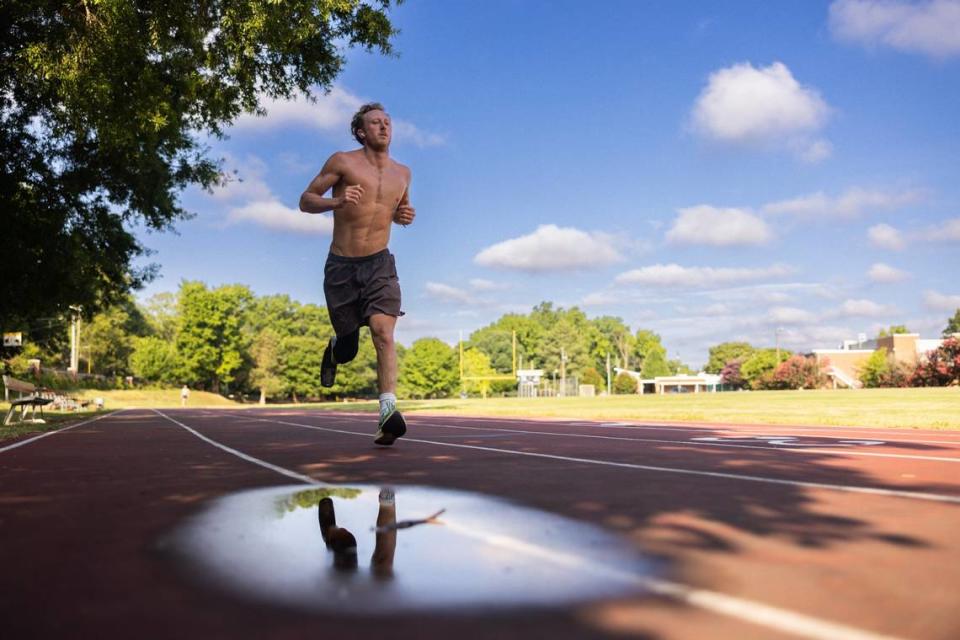
Becoming a triathlete
Stay, Calder.
It’s early Saturday morning at the Alexander Graham Middle School track in Charlotte, and Clough is busy knocking some rust off. Last week was a break week. He was fasting last week, too, he said, ahead of some blood work he needed to get done. Calder is his service dog — a furry yellow lab — and Calder jogged along Clough’s side for the runner’s first lap. Clough had gently asked him to stay so he could get on with his work.
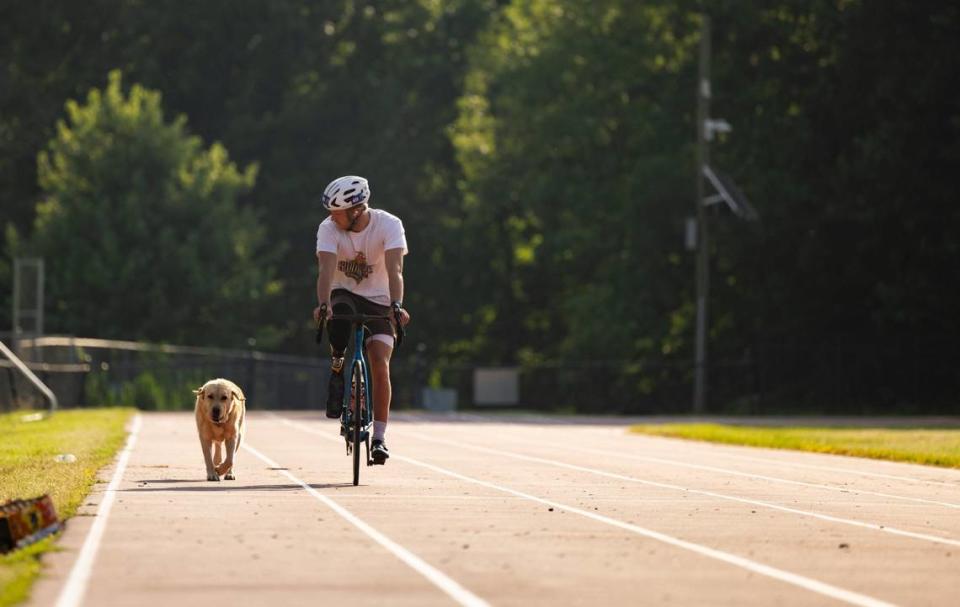
Clough estimates he devotes about 30 hours a week to training. He was always active as a kid — he played virtually every sport and walked on to the UNC-Chapel Hill lacrosse team — but never did he imagine becoming a triathlete. As Clough himself explains it: He only ran when he was in trouble; cycling was fun but never something he did for sport; and to this day, he and swimming have a love-hate relationship — and “right now, I hate swimming.”
But over the past few years, things fell into place in a way that is hard to understand to this day.
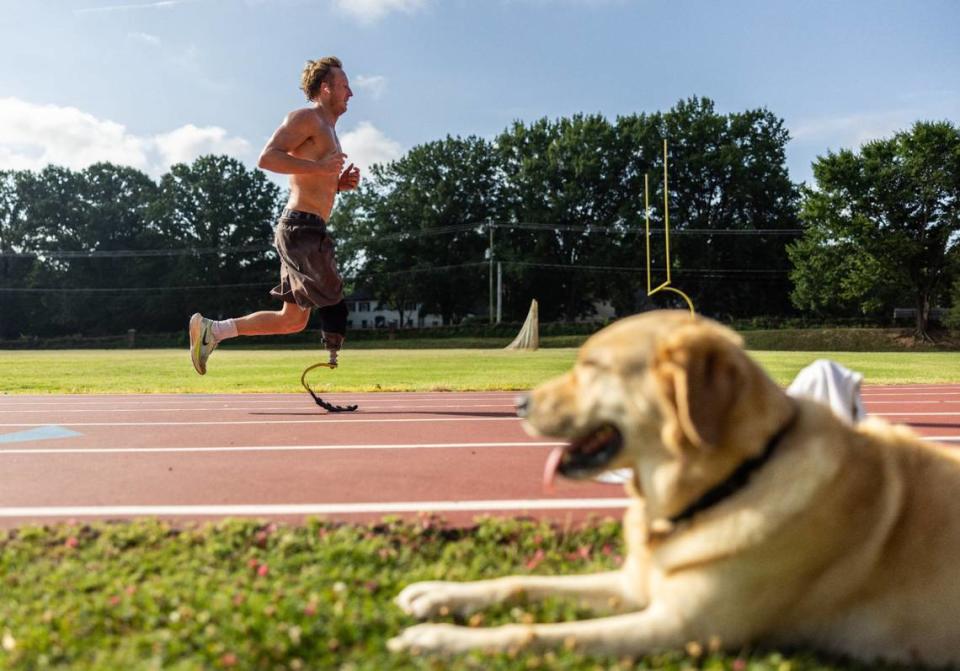
It started two-and-a-half years ago, in early 2022, when Clough was invited to apply to a Talent ID camp put on by USA Triathlon. He still doesn’t know how the organization got his information, exactly, he said, but that’s immaterial now. At that camp is where Clough met Mark Sortino, an accomplished triathlon coach and longtime assistant coach for Team USA’s Paralympian Triathlon team.
Sortino could tell Clough was a standout instantly, he said.
“He showed up in regular shorts,” Sortino said of their first meeting. “He only had one prosthetic leg — which was his everyday leg. He didn’t have a running blade. He didn’t have a cycling leg. He didn’t own a pair of bike shorts. He basically brought his goggles. I mean, literally, that’s it.
“We did a test with him in the pool after a few days, and he had a really good time, and his stroke looked really good. And I asked him, ‘Hey did you swim competitively?’ And he’s like, ‘No.’ And I’m like, how is that possible? You just don’t often see that. Being comfortable in the water and growing up in the water is quite different than swimming in a pool competitively. So that was the first thing.”
Sortino and Clough teamed up thereafter. Clough kept showing signs of potential, and Sortino kept pointing that potential in the right direction. Months of training went by, and Clough would do everything right: enlisting in real races, collecting proper equipment, trusting in Sortino and the coach’s simplified motto for a pretty complex sport: “What do we do well? Go fast.”
The work all came to a head — and quickly — when in June 2022, Sortino called Clough and told him that a few runners dropped out of a big international race in France and that Clough was now on the entry list and that he should run in it. Clough listened. A good finish there — 8th — set him up for another race in Spain, which set him up for another high-profile event, which set him up for another. With each race, his ranking improved, as did his notoriety.
Clough had three chances to be sent to the Paralympics. He could’ve finished first or second at the World Championships. He could’ve placed first or second at the Paris test event, which happened in late August. Or he could’ve ran first or second at the Continental Championships, which happened in Miami this past March.
Clough won the race in Miami. The win — as well as the work he put in to get into that position — pleasantly confounded his coach.
“I was one of the coaches who ran one of the first certified para triathlon camps back in 2010,” Sortino said. “And I’ve never seen anybody (rise like Carson has).”
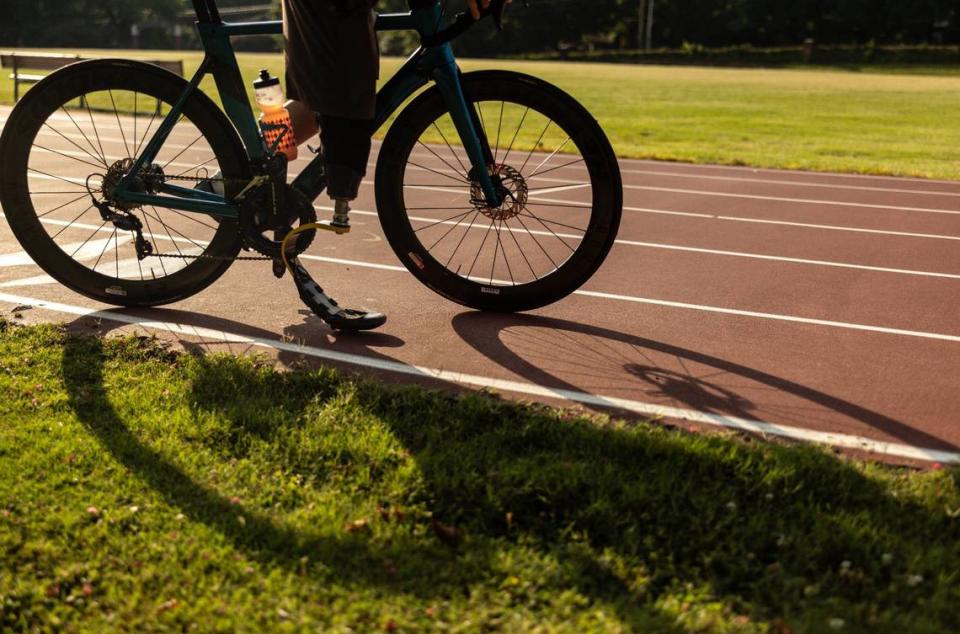
‘Is he alive?’
Clough took his first steps as a one-legged man on January 1, 2020. He began running triathlons in 2022 and is set to race for the flag later this summer.
That all borders on the unbelievable.
It especially does when you consider he could’ve died before any of it happened.
The evening that Carson Clough lost his leg and saw his life change forever, his parents were at home. His mother, Brenda, was “as relaxed as can be” after a long bike ride. His father, Barry, was upstairs. Around 9 p.m., the phone rang, and Barry took notes as he thumped down the steps and the Sheriff told him everything he knew — which was that Carson had been in a boating accident and that he was being airlifted and… well …
“That’s all we had,” Brenda said.
Added Barry: “We didn’t know where he was going or anything.”
Barry and Brenda would piece together what exactly happened over the next few hours and days. The report from their son went something like this:
Carson was on a friend’s boat with a few of his buddies wake surfing. He loved the sport. When he wasn’t working on getting his coffee shop off the ground — using his bachelor’s degree in biology to create the perfect coffee bean roast, or using his MBA from Florida Tech to turn an idea into a business — he was out on the water. On one of his runs that day, he fell off the wake board, and according to media reports, as the boat turned to pick him up, his legs got “tangled up with the prop of the boat,” the part where the blades spin. Both of his legs got munched. Blood spilled. His right foot, to this day, he said, “is still in the water.”
Carson said he didn’t remember much pain. “Adrenaline, baby, my best friend!” he says now. He didn’t relay exactly how his legs got tangled up in the prop, either. What he remembers is he saw blood in the water, and “I immediately was like, ‘OK, we got a problem. Let’s find a solution. The goal is to make sure I can see my family again.’” There was no time to panic. The two friends called 911, tightly tied both of his legs with the ski rope and had a helicopter waiting on him to take him to a hospital once they returned to dock. Carson then got “loaded up” with pain medication and soon returned to his goofy charm, looking out over the city, asking if anyone on the helicopter had a broom to massage the cramp in his IT band on his right leg.
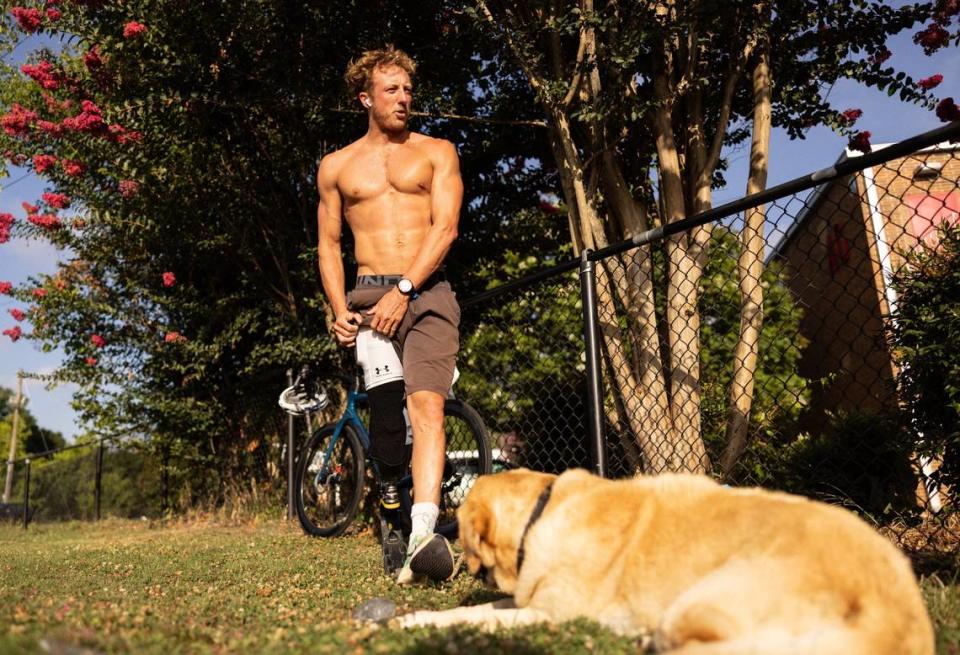
While all this was going on, Barry drove down to the lake. He saw media members and first-responders and the two friends who were with Carson. The friends were distraught and despondent, Barry remembered, but answered in the affirmative to the only question that mattered to him: “Is he alive?”
Meanwhile, Brenda was calling local hospitals until she learned that Carolinas Medical Center, which was about a half-mile from their house, had just admitted Carson. She popped right over and was directed to Carson’s room, where she heard her fast-talking son asking questions, cracking jokes, being himself.
“I walk into the room,” Brenda said, “and Carson is still on the gurney, and he’s chatting it up with these people who are all around him, and he sees me, and he raises his head and goes, ‘Mom, I’m gonna be fine. Technology’s great. I’m gonna be just fine.’”
Before getting wheeled into immediate surgery to amputate his right leg below the knee, his mother responded.
“I walked up to his head, and I said, ‘Yes you are. You’re going to be absolutely great because I’m talking to you,’” she said. “And I’m seeing those beautiful blue eyes. And I said, ‘This is gonna be a little bump in the road for you.’”
She continued: “And he said, ‘Mom, I’m going to be fine. There are people who were on the boat who are going to need you.’ And I said, ‘Honey, we got this. Let’s take care of you. I’ve got that. And we’ll keep going.’”
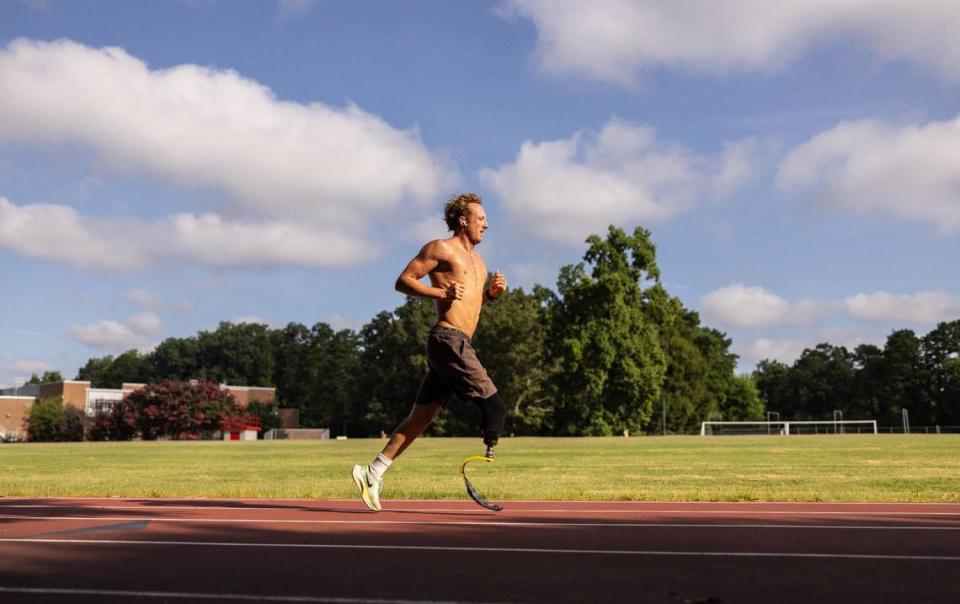
A challenge Carson Clough could handle
Recovering from such an injury is rarely linear or polished or easy. Carson’s parents explain that they looked for one piece of uplifting information a day that they could latch onto and run with. Memories of Carson’s recovery come in snapshots — one is of all the visitors that came through his room in the nine days after his immediate surgery, another is of his friends wheeling him the 0.5 miles back home, another is the first time Carson drove a car again with his mom in the passenger seat.
But the one thing that sticks out most is the perspective Carson had — the positivity and selflessness that wouldn’t be denied. Many who came through to visit him in the hospital arrived with tears and left with laughs.
It was the only way he’d allow it to go. And that’s because by any measure, he had the perfect life, he said. A “spoiled” one, even. He had a loving family. A loving community. The means to get quality proper health care. All he endured was physical pain, he said, whereas others endured a much more difficult, emotional grief, and he considered it his job to never dwell, to forge ahead — so that everyone else around him could, too.
“The way I looked at it is, ‘Why do I get all this? Why am I so spoiled?’” Carson said. He added, “Yeah, I got a little bit to complain about. But it was almost like, things were going too well that I was going to not appreciate it. And so if Mother Nature needed someone to give a challenge to that day, I’m glad she gave it to me. I was ready for it.”
He continued: “I didn’t know I would be ready for it at the time, and there would be challenges that would test me again. ‘Hey, am I still ready for this?’ But, you know, I was prepared for it somehow.”
When relayed this perspective from Clough, Sortino shrugged in admiration.
“I think it’s beautiful,” the coach said. “I don’t think a lot of people have that. I think it speaks volumes to his character as a person who doesn’t waste time not living life, you know?”
Said Barry, simply and lovingly: “He’s a unique guy.”
Finding a new balance
This past week, Clough was punctuating his off week on the water. Virginia Beach. Him and a surfboard. For the first time, to avoid worrying about his leg falling off in the sea, Clough decided to keep the prosthetic off and to surf on his knees. It worked. He shuffled up and down his board. Did a cut-back once. Caught wave after wave after wave as his parents and siblings watched.
“Oh my gosh,” Clough remembers thinking, “I’m getting the same feeling.”
Five years ago, he almost died in the water. This past week, a leg down and an Olympics ahead of him, it’s hard to imagine Clough could’ve felt more alive.

 Yahoo Sports
Yahoo Sports 
